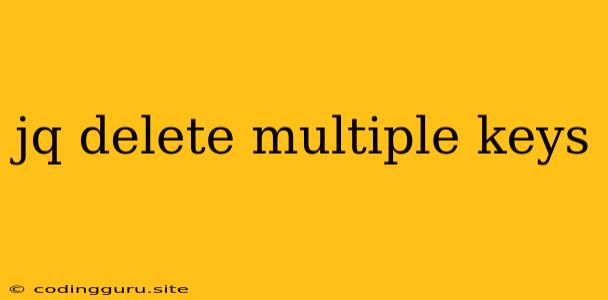Deleting Multiple Keys with jq: A Guide
jq is a powerful command-line JSON processor that offers a wide range of functionalities for manipulating and querying JSON data. One of its key features is the ability to delete keys and values from JSON objects. This article will guide you on how to use jq to efficiently delete multiple keys from a JSON object.
Understanding the jq delete Operator
The fundamental operator for deleting keys and values within a JSON object using jq is the del operator. This operator takes a path to the key or keys you want to remove. For instance, to delete the key "name" from a JSON object, you would use the following command:
jq '.name' < input.json
Example:
Let's consider a sample JSON object:
{
"name": "John Doe",
"age": 30,
"city": "New York",
"country": "USA"
}
To delete the "name" and "age" keys, you would use the following jq command:
jq 'del(.name, .age)' < input.json
This will result in the following output:
{
"city": "New York",
"country": "USA"
}
Deleting Multiple Keys with the delpaths Operator
For more complex scenarios involving deleting multiple keys that might be nested or follow a pattern, the delpaths operator is your go-to tool. It takes an array of paths as input and deletes the corresponding keys and values.
Example:
Assume you have a JSON object:
{
"person": {
"name": "Alice",
"address": {
"street": "123 Main St",
"city": "Anytown",
"zip": "12345"
}
},
"company": {
"name": "Acme Corp",
"location": {
"city": "Springfield",
"state": "Illinois"
}
}
}
To delete the "street" and "city" keys from both the "person" and "company" objects, you could use the following command:
jq 'delpaths(["person.address.street", "person.address.city", "company.location.street", "company.location.city"])' < input.json
This command will result in the following output:
{
"person": {
"name": "Alice",
"address": {
"zip": "12345"
}
},
"company": {
"name": "Acme Corp",
"location": {
"state": "Illinois"
}
}
}
Using jq for Dynamic Key Deletion
jq allows you to use expressions and filters to dynamically select keys for deletion. This proves highly useful when dealing with JSON objects containing potentially varied structures or where the keys you want to delete are determined based on certain criteria.
Example:
Let's say you have a JSON object with several entries, and you want to delete all keys that start with "prefix_".
jq '. | with_entries(select(keys[] | startswith("prefix_")) | del)' < input.json
This command will iterate through each key-value pair in the JSON object and delete those keys whose names start with "prefix_".
Deleting Keys based on Values
You can also use jq to delete keys based on the values they hold. For instance, if you want to delete all keys where the value is an empty string, you can use the following command:
jq 'with_entries(select(.value == "") | del)' < input.json
This command will iterate through each key-value pair in the object and delete keys whose values are empty strings.
Conclusion
jq provides a versatile toolkit for manipulating JSON data, including deleting keys. Whether you need to remove specific keys, dynamically select keys for deletion based on their names or values, or work with nested structures, jq offers a powerful and concise solution for effectively managing your JSON data.
By understanding the fundamental operators and their combinations, you can harness the full potential of jq to confidently manipulate and modify your JSON data as needed.
